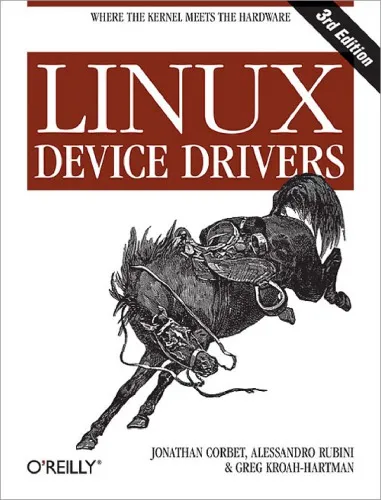Linux Device Drivers, Third Edition Jonathan Corbet, Greg Kroah-Hartman, Alessandro Rubini
4.7
بر اساس نظر کاربران

شما میتونید سوالاتتون در باره کتاب رو از هوش مصنوعیش بعد از ورود بپرسید
هر دانلود یا پرسش از هوش مصنوعی 2 امتیاز لازم دارد، برای بدست آوردن امتیاز رایگان، به صفحه ی راهنمای امتیازات سر بزنید و یک سری کار ارزشمند انجام بدینIntroduction to "Linux Device Drivers, Third Edition"
Written by seasoned experts Jonathan Corbet, Greg Kroah-Hartman, and Alessandro Rubini, "Linux Device Drivers, Third Edition" is an authoritative resource for software developers and system programmers keen on understanding and mastering the art of Linux kernel and device driver development. This book serves as a cornerstone for anyone who wishes to delve deep into the inner workings of the Linux operating system and its underlying hardware interface.
Detailed Summary of the Book
The third edition of "Linux Device Drivers" stands out as a definitive guide for creating and working with device drivers within the Linux environment. It carefully blends theoretical knowledge with hands-on coding examples, making complex concepts easier to grasp. The authors begin by offering a fundamental overview of the Linux kernel architecture and quickly immerse readers in the world of various device types, file operations, kernel modules, and hardware handling.
Starting from the basics, such as creating skeleton drivers and explaining their behavior, the book progresses to advanced topics like synchronization, concurrency in the kernel, memory management, and interrupt handling. Since the world of Linux is ever-changing, this edition includes updates that align with the modern 2.6 kernel, incorporating the latest features and best practices. It balances detailed technical explanations with real-world examples, such as writing drivers for char devices, block devices, and network interfaces.
Another invaluable element of this book is its focus on helping developers adhere to the Linux kernel’s standards and coding practices. Alongside practical examples, the authors provide insights into debugging techniques, performance optimization, and device access permissions, ensuring robust design and secure implementations of device drivers. The culmination of these efforts is a comprehensive guide that paves the way for professionals to write efficient code and solve real-world problems effectively.
Key Takeaways
- Comprehensive Exploration: The book thoroughly explores Linux kernel internals, ensuring readers grasp the full lifecycle of device driver creation.
- Hands-on Examples: Practical coding exercises with real-world applications help bridge theory and practice.
- Updated for Modern Kernels: The third edition reflects updates for Linux kernel 2.6 and newer versions, making the content relevant to contemporary systems.
- Focus on Best Practices: Readers learn the importance of adhering to coding standards within the Linux ecosystem.
- Debugging and Optimization: Detailed sections on debugging techniques and performance tuning empower developers with tools to refine their projects.
- Accessibility: It simplifies complex concepts, making the book suitable for both beginners and experienced kernel developers.
Famous Quotes from the Book
“Most software developers can keep their work confined to the world of software abstractions. Driver authors, on the other hand, often need to be able to ‘think like hardware.’”
“A solid understanding of Linux kernel internals is not only useful, it is essential for good driver development.”
“Linux is powerful because of its community-driven ecosystem. Writing device drivers is contributing to this ecosystem responsibly.”
Why This Book Matters
"Linux Device Drivers, Third Edition" matters for several reasons. First and foremost, Linux powers a significant portion of servers, embedded systems, IoT devices, and mobile technologies worldwide. Understanding how to write device drivers for Linux opens doors to numerous career opportunities in systems programming, kernel development, and embedded software engineering.
Moreover, this book teaches readers how to navigate the complexities of hardware-software interaction through clear examples and explanations. By elucidating kernel mechanisms, synchronization primitives, and debugging nuances, it empowers developers to write code that is not only functional but also reliable and maintainable.
Finally, the book reflects the philosophy of open-source development, encouraging readers to contribute to the larger Linux ecosystem. By mastering the principles and practices laid out in these chapters, developers can create innovations that benefit the global community and elevate the quality of Linux-powered systems.
دانلود رایگان مستقیم
شما میتونید سوالاتتون در باره کتاب رو از هوش مصنوعیش بعد از ورود بپرسید
دسترسی به کتابها از طریق پلتفرمهای قانونی و کتابخانههای عمومی نه تنها از حقوق نویسندگان و ناشران حمایت میکند، بلکه به پایداری فرهنگ کتابخوانی نیز کمک میرساند. پیش از دانلود، لحظهای به بررسی این گزینهها فکر کنید.
این کتاب رو در پلتفرم های دیگه ببینید
WorldCat به شما کمک میکنه تا کتاب ها رو در کتابخانه های سراسر دنیا پیدا کنید
امتیازها، نظرات تخصصی و صحبت ها درباره کتاب را در Goodreads ببینید
کتابهای کمیاب یا دست دوم را در AbeBooks پیدا کنید و بخرید
1209
بازدید4.7
امتیاز50
نظر98%
رضایتنظرات:
4.7
بر اساس 0 نظر کاربران
"کیفیت چاپ عالی بود، خیلی راضیام"
Questions & Answers
Ask questions about this book or help others by answering
No questions yet. Be the first to ask!


